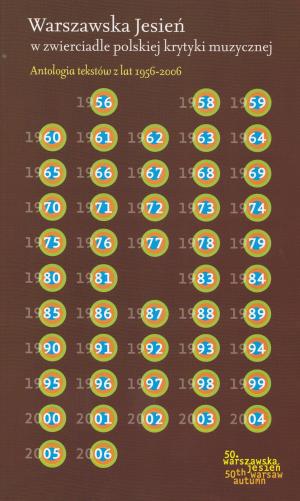






The Warsaw Autumn Festival in Polish music criticism
 An anthology of texts from 1956 through 2006
An anthology of texts from 1956 through 2006
Published by Warsaw Autumn, Warsaw 2007
Edited by Ewa Radziwon-Stefaniuk
Text selection: Krzysztof Droba
This anthology of critical texts from the years 1956-2006 was triggered by a national competition for secondary music school students, organised in Łódź in September 2007 under the title Closer to the Autumn where students were asked about the history of Warsaw Autumn. Archival research generated a significant amount of source material, from which a series of texts were selected that described the Warsaw Autumn Festival through typical media coverage, written in the heat of the event. From these, the most comprehensive texts were selected.
As editor Krzysztof Droba indicates in his foreword, the resulting anthology encompasses a wide gamut of critical texts: reports, reviews, articles, columns, essays, interviews and surveys. Additionally, three documents are featured at the end of the book: a reminiscence on Tadeusz Baird (one of Warsaw Autumn's founding fathers) and reports by Olgierd Pisarenko and Tadeusz Wielecki, for many years directors of the Festival. All texts are reproduced in full (with minor exceptions for a few newspaper columns where excerpts not related to the Warsaw Autumn Festival have been omitted) […].
The present anthology is a first step towards a full documentation of the reception of Warsaw Autumn in Polish criticism. […] It includes 70 texts, showing the Festival's development over the half-century of its existence. Moreover, these texts also speak of the condition of Polish criticism. It was the Warsaw Autumn Festival, after all, that forced the elaboration of a new language and axiology, in short, a new music criticism for new music. Did this 'new criticism' come to being If so, what values did it introduce These questions are answered by the present anthology. There is no doubt that the Warsaw Autumn Festival influenced the emergence of a new critical language more adapted to the new phenomena in contemporary music.
Available through the Warsaw Autumn Festival Office.




